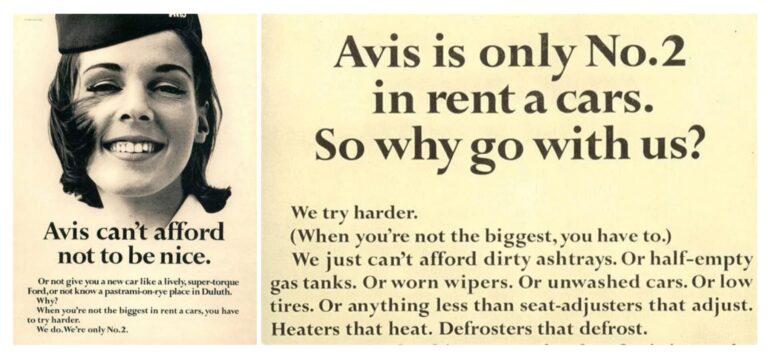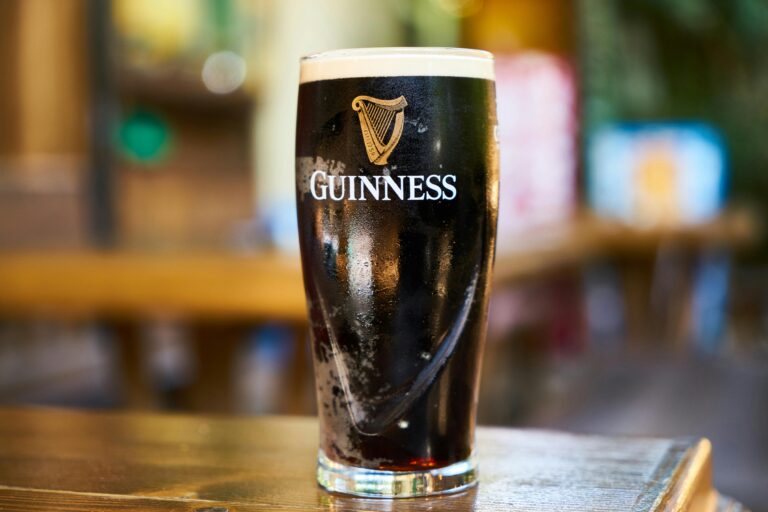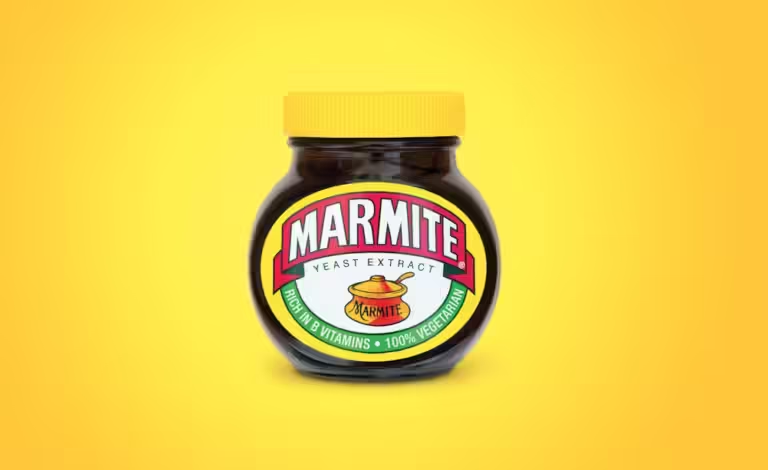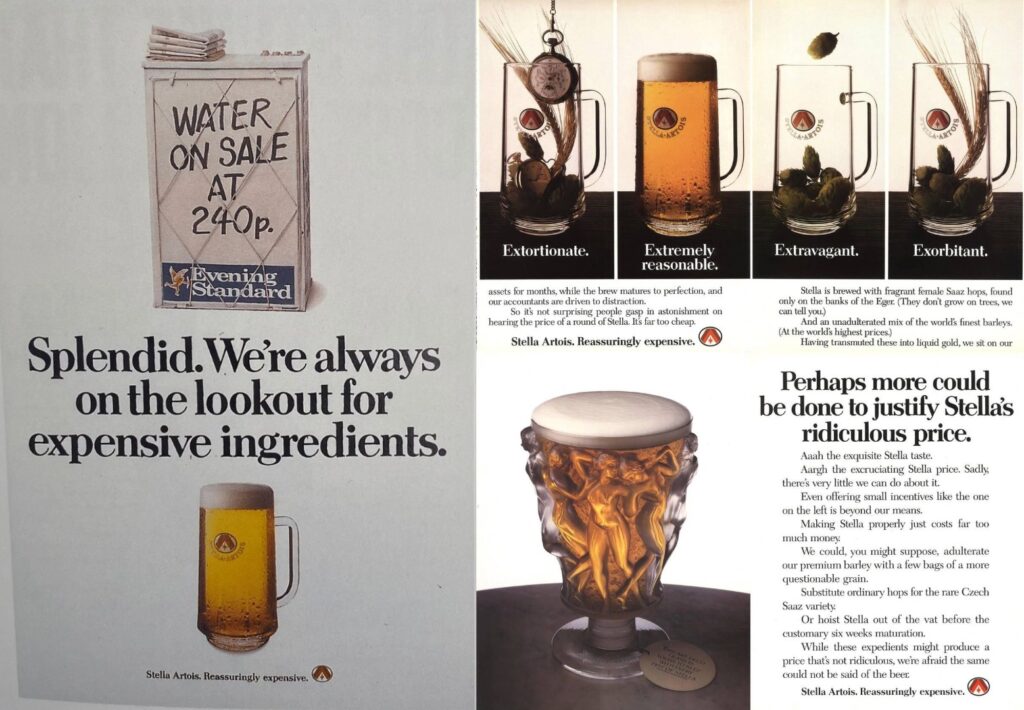5 Marketing Campaigns That Proved "Negative" Can Be a Powerful Brand Asset
We highly underestimate the effect of advertisement on how we perceive products and services. In the realm of marketing, perception is often more powerful than reality. Brands have long understood this, leveraging negative perceptions to their advantage. By crafting clever advertising campaigns that challenge conventional thinking, they can turn potential weaknesses into strengths.
In this blog post, we’ll explore five remarkable examples of brands that defied expectations and capitalized on negative aspects of their brand. These companies didn’t shy away from their shortcomings; instead, they embraced them, transforming them into unique selling propositions. Join me as we delve into the art of perception and discover how these brands turned adversity into opportunity.
Avis : When you’re only No. 2, you try harder

Avis, a car rental company, was struggling to compete with the then-market leader, Hertz. Always playing second fiddle, Avis knew it needed a drastic change. They turned to the advertising agency Doyle Dane Bernbach (DDB) for help.
At DDB, copywriter Paula Green was searching for a slogan when she realized that Avis’s “underdog” status could be a powerful differentiator. This led to the iconic “We try harder” slogan.
The campaign proved to be a game-changer for Avis. Their market share surged from 29% to 36% in just four years. Hertz, initially dismissive of the campaign, couldn’t ignore the impact as their market share plummeted from 61% to 49%.
In 1966, Hertz finally responded with their own campaign. However, the battle between the two giants continued for decades. Despite its success, Avis never managed to surpass Hertz as the industry leader.
In the 1990s and 2000s, both companies heavily focused on the airport market. This strategy backfired when the 9/11 attacks and the subsequent recession severely impacted air travel. This opened the door for Enterprise to rise and eventually overtake both Avis and Hertz.
For Paula Green, the story has a deeply personal resonance. She often remarked that the “We Try Harder” slogan mirrored her own experiences as a woman working in a male-dominated field in the 1960s. It was a time when women had to consistently prove themselves and go the extra mile. This successful campaign not only boosted Avis’s market share but also empowered Green to launch her own advertising agency. As noted by The Denver Post, the “We Try Harder” campaign has become an enduring inspiration for second-position brands like Pepsi, Apple, and Virgin Airlines, demonstrating the power of embracing the underdog status and leveraging it as a marketing advantage.

Cream Cake : Naughty but Nice
Unlike other advertisements on this list, these ads were not sponsored by a commercial company. Instead, they were commissioned by the National Dairy Council, in association with the now-defunct Milk Marketing Board. The goal was to increase milk consumption.
The organization entrusted this task to the advertising agency Ogilvy & Mather. The product being advertised was cream cake, a treat high in sugar and fat, often perceived as unhealthy.
A young copywriter at O&M observed a unique psychological aspect of indulging in such treats: the feeling of guilt often experienced after consuming something delicious yet potentially sinful. This inspired the remarkable slogan, “Naughty but Nice.”
The campaign’s impact was further amplified by a series of simple yet memorable television commercials featuring popular British entertainers of the era, such as Larry Grayson, Les Dawson, and Barbara Windsor. These ads, aired throughout the 1970s and 1980s in the UK, have since become a nostalgic touchstone for many.
Interestingly, the young copywriter behind this iconic slogan went on to achieve literary fame as the renowned author Salman Rushdie.
Also, you may recognize the name of young copywriter, his name Salman Rushdie. I came to know about this ad campaign while reading his Wikipedia page.
Guinness : Good things comes to those who wait.

The iconic Irish stout, Guinness, faced a unique marketing challenge: its signature pouring process, requiring time for the distinctive creamy head to form, was perceived by some consumers as a drawback. To address this, Guinness turned to the advertising agency Abbott Mead Vickers BBDO (AMV).
AMV brilliantly reframed this perceived “negative” into a positive with the “Good Things Come to Those Who Wait” campaign, launched in 1996. The campaign, spearheaded by the iconic “Swimblack” commercial, successfully positioned the pour as an integral part of the Guinness experience, emphasizing the anticipation and reward associated with it.
This campaign proved highly successful for Guinness, boosting sales, particularly among older demographics. It also cemented AMV’s relationship with the brand, which they had recently acquired from Ogilvy.
The campaign’s legacy extends beyond sales figures. The “Surfer” commercial, another celebrated piece from this era, was voted “Best Ad of All Time” in a 2002 poll conducted by The Sunday Times and Channel 4, solidifying the campaign’s place in advertising history.
The slogan was formed by the advertising agency Abbott Mead Vickers BBDO. First piece of campaign was launched with swimblack TV commercial. During its original 4-year duration of campaign, Guinness was able to boost its sell especially in older demographic. Others critically acclaimed TV commercial in this campaign was surfer, which went on to be voted the “Best Ad of All Time” in a poll conducted by The Sunday Times and Channel 4 in 2002.
Marmite : You either hate it or love it

In 1996, Marmite, a yeast extract spread company now owned by global food giant Unilever, launched a memorable slogan. Unlike other brands that faced general negativity, Marmite’s challenge stemmed from a deeply polarized consumer base. Some people were ardent lovers, while others vehemently disliked it – there was no middle ground.
DDB London, with Andy Mcleod and Richard Flintham at the helm, was tasked with addressing this unique situation. Recognizing the stark divide in consumer sentiment, they crafted the iconic tagline: “You either hate it or love it.”
Mcleod himself emphasized that it was less of a traditional slogan and more of a statement of fact, accurately reflecting the reality of Marmite’s consumer experience.
Stella Artois : Reassuringly expensive

Stella Artois, a Belgian lager known for its rich history and meticulous brewing process, commanded a premium price. This premium positioning, while reflecting the brand’s quality, presented a unique marketing challenge.
In the 1980s, some consumers perceived Stella Artois’s higher price point as a drawback. They questioned whether the perceived value truly justified the extra cost. This perception threatened to undermine the brand’s exclusivity and appeal to discerning consumers.
To address this challenge, Stella Artois turned to advertising legend Frank Lowe. Lowe, who had previously crafted successful campaigns for the brand, recognized the opportunity to reframe the price as a point of distinction. He masterminded the iconic “Reassuringly Expensive” slogan. This bold statement not only acknowledged the higher price but also positioned it as a reassuring indicator of quality and exclusivity. It conveyed the message that Stella Artois was a premium product worth the investment.
The “Reassuringly Expensive” campaign proved to be a resounding success. It not only elevated Stella Artois’s brand image but also solidified its position as a premium beer. The slogan became synonymous with the brand, reinforcing its association with sophistication and discerning taste.
This enduring legacy is evident in recent campaigns, such as the 2024 collaboration with David Beckham. While many brands might have prominently featured Beckham’s face to capitalize on his popularity, Stella Artois chose a more understated approach, aligning with the brand’s emphasis on understated luxury and the inherent value of the Stella Artois experience. This subtle approach, rather than overt celebrity endorsement, further reinforced the “Reassuringly Expensive” ethos and resonated with consumers who appreciate a brand that values quality and sophistication over flashy endorsements.

The “Reassuringly Expensive” campaign proved to be a resounding success. It not only elevated Stella Artois’s brand image but also solidified its position as a premium beer. The slogan became synonymous with the brand, reinforcing its association with sophistication and discerning taste.
This enduring legacy is evident in recent campaigns, such as the 2024 collaboration with David Beckham. While many brands might have prominently featured Beckham’s face to capitalize on his popularity, Stella Artois chose a more understated approach, aligning with the brand’s emphasis on understated luxury and the inherent value of the Stella Artois experience. This subtle approach, rather than overt celebrity endorsement, further reinforced the “Reassuringly Expensive” ethos and resonated with consumers who appreciate a brand that values quality and sophistication over flashy endorsements.

